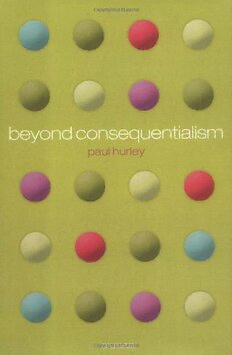
Beyond Consequentialism PDF
Preview Beyond Consequentialism
Beyond Consequentialism Consequentialism, the theory that morality requires us to promote the best overall outcome, is the default alternative in contemporary moral philosophy, and is highly influential in public discourses beyond academic philosophy. Paul Hurley argues that current discussions of the challenge of consequentialism tend to overlook a fundamental challenge to consequentialism. The standard consequentialist account of the content of morality, he argues, cannot be reconciled to the authoritativeness of moralstandardsforrational agents.Ifrational agentstypicallyhavedecisive reasons to do what morality requires, then consequentialism cannot be the correct account of moral standards. Hurleybuildsuponthis challengetoarguethattheconsequentialist case forgroundingtheimpartialevaluationofactionsintheimpartialevaluation ofoutcomesisbuiltuponasetofsubtleandmutuallyreinforcingmistakes. Through exposing these mistakes and misperceptions, he undermines consequentialist arguments against alternative approaches that recognise a distinct conception of impartiality appropriate to the evaluation of actions. A moral theory that recognizes a fundamental role for such a distinct conception ofimpartiality canaccount for therational authority of moral standards, but it does so, Hurley argues, by taking morality beyond consequentialism in both its standard and non-standard forms. Paul Hurley is Professor of Philosophy at Claremont McKenna College, California. This page intentionally left blank Beyond Consequentialism Paul Hurley 1 1 GreatClarendonStreet,Oxfordox26dp OxfordUniversityPressisadepartmentoftheUniversityofOxford. ItfurtherstheUniversity’sobjectiveofexcellenceinresearch,scholarship, andeducationbypublishingworldwidein Oxford NewYork Auckland CapeTown DaresSalaam HongKong Karachi KualaLumpur Madrid Melbourne MexicoCity Nairobi NewDelhi Shanghai Taipei Toronto Withofficesin Argentina Austria Brazil Chile CzechRepublic France Greece Guatemala Hungary Italy Japan Poland Portugal Singapore SouthKorea Switzerland Thailand Turkey Ukraine Vietnam OxfordisaregisteredtrademarkofOxfordUniversityPress intheUKandincertainothercountries PublishedintheUnitedStates byOxfordUniversityPressInc.,NewYork ©inthisvolumePaulHurley2009 Themoralrightsoftheauthorhavebeenasserted DatabaserightOxfordUniversityPress(maker) Firstpublished2009 Firstpublishedinpaperback2011 Allrightsreserved.Nopartofthispublicationmaybereproduced, storedinaretrievalsystem,ortransmitted,inanyformorbyanymeans, withoutthepriorpermissioninwritingofOxfordUniversityPress, orasexpresslypermittedbylaw,orundertermsagreedwiththeappropriate reprographicsrightsorganization.Enquiriesconcerningreproduction outsidethescopeoftheaboveshouldbesenttotheRightsDepartment, OxfordUniversityPress,attheaddressabove Youmustnotcirculatethisbookinanyotherbindingorcover andyoumustimposethesameconditiononanyacquirer BritishLibraryCataloguinginPublicationData Dataavailable LibraryofCongressCataloginginPublicationData Dataavailable TypesetbyLaserwordsPrivateLimited,Chennai,India PrintedintheUnitedKingdomby LightningSourceUKLtd.,MiltonKeynes ISBN978–0–19–955930–5(Hbk) ISBN978–0–19–969843–1(Pbk) For My Wife, Mary Braet and My Mother, Joy Hurley This page intentionally left blank Acknowledgments I am grateful for Kurt Baier’s advice to develop the implications of my earlierworkforthedebatebetweenconsequentialists andtheir critics—he saw the outlines of this book long before I did. A special debt of gratitude is owed as well to David Gauthier, Jean Hampton, and Shelly Kagan for their invaluable role in the early development of many of the arguments presented here. The writings of T. M. Scanlon and Samuel Scheffler have also served as an ongoing source of insight and inspiration. I have benefited from discussions of this material with Stephen Darwall, Fred Schueler, Mark LeBar, Elizabeth Radcliffe, Peter Graham, John Fischer, Corey Brettschneider, Ted Hinchman, Voula Tsounas, Andrews Reath, Alan Nelson, Pierre Keller, Derek Parfit, Michael Meyer, Aaron James, Margaret Gilbert, Hilary Bok, Geoff Sayre-McCord, Amy Kind, Suzanne Obdrzalek, Stephen Davis, Noell Birondo, Peter Kung, Peter Thielke, Ann Davis, Emma Sabean, Michael Green, and Masahiro Yamada. I am particulary grateful for extensive written and oral comments on substantial portionsofthemanuscriptfromGaryWatson,CharlesYoung,AlexRajczi, Dion Scott-Kakures, and Mark Lance, and owe an even deeper debt of gratitude to Arthur Ripstein, David Cummiskey, and Rivka Weinberg, whoprovidedinvaluablecommentsandcriticismsontheentiremanuscript atvariouscrucialstagesinitsdevelopment.Ihavereceivedhelpfulfeedback on parts of this material from audiences at UC Riverside, Georgetown University, Ohio University, Occidental College, UC Santa Barbara, The UniversityofNewMexico,UCIrvine,andtheClaremontCollegesWorks in Progress Group. I have also presented portions of this material to many of my classes, and have benefited greatly from many of these discussions. Particular thanks areduetothemembersofthePhilosophy Departmentat Santa Clara University for inviting me to spend an extremely productive term as a visiting Fagothey Professor. AdditionaldebtsofgratitudeareowedtoPeterMomtchiloffandCather- ine Berry of Oxford University Press for their expertise in overseeing the publication of this book, to Celina Rosas for timely technical assistsance, to Kim Allen for copy editing, to Andrew Hawkey and Cory Davia for viii acknowledgments proofreading, and to my sons Paul and Joe, who help me keep my feet on the ground when my head is in the clouds. Gratitude is also due to the journal Ethics for granting me permission to use revised portions of myessay‘‘DoesConsequentialism MakeTooManyDemands,orNoneat All?’’(Volume 116,July (2006),pp. 680–706). Contents 1. Introduction 1 2. TheChallenge to Consequentialism: A Troubling Normative Triad 10 3. TheDemandingness Objection: Too Demanding, or Not Demanding at All? 35 4. Harnessing Williams to Sharpen the Challenge to Consequentialism 62 5. Deflating the Challenge of Consequentialism 106 6. From Impersonality to Interpersonality: Alternative Conceptions of Impartiality 139 7. Impartial Evaluation and Rational Authority 177 8. Generalizing to Other Forms of Consequentialism 226 References 264 Index 271
